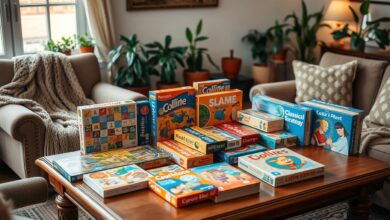Engaging Brain Games for Seniors at Home

Research shows that engaging in memory and brain games can help older adults stay “fresher and sharper for a longer period.” As people age, they may experience slower mental processing, but training in one cognitive skill can enhance other areas like memory and attention. While playing mind games doesn’t prevent dementia or Alzheimer’s, it gives the brain a beneficial workout. Seniors can enjoy a variety of engaging brain games for seniors at home, including cognitive exercises, memory training, puzzle games, mind teasers, and brain fitness activities like trivia, word puzzles, logic games, and more.

Table of Contents
Key Takeaways
- Engaging in brain games may help keep seniors mentally sharp as they age.
- Cognitive exercises can benefit multiple areas of cognition, such as memory and attention.
- Playing mind games provides a brain workout without preventing dementia or Alzheimer’s.
- Seniors can enjoy a variety of games and activities to stimulate their minds.
- Brain games for seniors at home can include trivia, word puzzles, logic games, and more.
Introduction to Brain Games for Seniors
As we age, maintaining mental stimulation becomes increasingly crucial for cognitive health. Brain games, memory exercises, and other cognitive activities can be powerful tools for older adults to keep their minds sharp and delay age-related cognitive decline. These engaging pursuits not only provide mental stimulation but also offer a range of benefits for seniors.
Importance of Mental Stimulation for Aging Adults
Just as physical exercise is important for the body, brain exercises are essential for the mind. Engaging in memory and brain games can help older adults stay mentally sharp and prevent cognitive decline. Research has shown that training in one cognitive skill can benefit other areas of cognition, such as memory and attention.
Benefits of Brain Games and Cognitive Exercises
- Improved processing speed
- Enhanced memory and recall
- Stronger problem-solving and critical thinking skills
- Reduced risk of dementia and Alzheimer’s disease
- Increased social engagement and mental well-being
While brain games don’t prevent dementia or Alzheimer’s, they provide valuable mental stimulation and offer a range of benefits that can support cognitive health as we age.
“Challenging the brain with new activities and mental exercises can help maintain cognitive function and delay decline as we age.”
By incorporating a variety of brain games and cognitive exercises into their daily routine, seniors can enjoy the numerous benefits for their mental stimulation, cognitive health, and overall well-being.
Classic Word and Memory Games
For seniors, classic word and memory games can be a delightful way to keep the mind active and engaged. These stimulating activities not only provide cognitive stimulation but also promote social interaction and enhance overall well-being.
Trivia Quizzes for Recalling Knowledge
Trivia quizzes are a fantastic way for seniors to test their recall of information across a wide range of subjects. Whether it’s current events, history, literature, or pop culture, these quizzes challenge the brain to retrieve stored knowledge, strengthening memory and cognitive abilities. Playing trivia with friends or family can also foster social connections and healthy competition.
Word Search and Crossword Puzzles
Word search and crossword puzzles are time-honored classics that have long been known to provide cognitive benefits for seniors. These word games engage multiple brain regions, activating the cortex and strengthening the hippocampus by forming new connections to solve the puzzles. Research has shown that regularly doing crossword puzzles can improve focus, executive function, and working memory in older adults.
| Brain Game | Benefits |
|---|---|
| Trivia Quizzes | Improved memory recall, enhanced knowledge retention, social engagement |
| Word Search | Increased cognitive stimulation, enhanced vocabulary, improved focus |
| Crossword Puzzles | Improved executive function, enhanced working memory, better focus |
“Engaging in regular brain games can significantly improve cognitive function and delay the onset of age-related cognitive decline in seniors.”
Logic and Strategy Board Games
Engaging the brain in challenging yet rewarding activities is crucial for senior health and well-being. Logic and strategy board games offer a delightful way for older adults to exercise their cognitive abilities while enjoying quality time. Two classic examples that stand out are the captivating game of Sudoku and the timeless chess.
Sudoku for Logical Thinking
Sudoku is a number-based puzzle game that fosters logical thinking, reasoning skills, and problem-solving abilities. By manipulating sequences of numbers and letters, seniors actively engage the frontal lobe of the brain, which is responsible for these cognitive functions. Completing a Sudoku puzzle provides a sense of accomplishment that can be highly rewarding for older adults, keeping their minds sharp and engaged.
Chess: A Timeless Challenge
The game of chess has captivated minds for centuries, and it continues to be a beloved pastime for seniors. This strategic board game challenges players to think ahead, predict outcomes, and devise winning moves. The mental exercise involved in playing chess stimulates critical thinking, problem-solving, and decision-making skills – all of which are essential for maintaining cognitive health in the golden years.
Both Sudoku and chess offer seniors the opportunity to engage in mentally stimulating activities that can help slow cognitive decline and provide a sense of accomplishment. By incorporating these logic and strategy games into their daily routines, older adults can keep their minds active and enjoy the benefits of lifelong learning.
| Game | Benefits | Research Findings |
|---|---|---|
| Sudoku | Logical thinking Reasoning skills Problem-solving abilities | Playing puzzle games for just five minutes a day has been shown to boost brain function and prevent cognitive decline. Sudoku actively engages the frontal lobe, which is responsible for manipulating sequences. |
| Chess | Strategic thinking Critical thinking Problem-solving | Chess challenges players to think ahead, predict outcomes, and use strategic planning, stimulating essential cognitive abilities. Board games have been suggested to help slow cognitive decline and reduce depression in the elderly. |
By engaging in logic games and strategy games like Sudoku and chess, seniors can maintain their mental sharpness, problem-solving skills, and a sense of accomplishment, all while enjoying quality time with themselves or loved ones.
brain games for seniors at home
Online Brain Training Apps and Games
With the rise of technology, there are numerous online brain training apps and games that can be enjoyed by seniors in the comfort of their own homes. These digital brain games often incorporate personalized training programs, progress tracking, and the ability to challenge others, making them engaging and motivating for older adults. Research suggests that just two weeks of playing certain video games, such as Super Mario and Angry Birds, can significantly improve recognition memory in older adults aged 60-80.
Video Games for Cognitive Stimulation
Beyond online brain training apps, video games can also offer cognitive stimulation for seniors. Studies have shown that engaging in video game play can reduce the risk of cognitive disorders like dementia and Alzheimer’s disease. Games that require strategic thinking, problem-solving, and memory skills, such as Sudoku and Crossword Puzzles, can help seniors maintain and even improve their mental abilities.
| Game Type | Benefits for Seniors |
|---|---|
| Sudoku | Improved concentration and problem-solving skills |
| Crossword Puzzles | Enhanced creative thinking and vocabulary expansion |
| Jigsaw Puzzles | Improved spatial reasoning and cognitive coordination |
| Memory Games | Enhanced short-term memory and focus |
By incorporating a variety of online brain games and video game experiences, seniors can engage in cognitive stimulation that not only keeps their minds sharp but also provides enjoyment and social interaction from the comfort of their own homes.

Arts, Crafts, and Creative Pursuits
Engaging in arts and crafts activities can provide tremendous cognitive benefits for older adults. These creative pursuits encourage the use of both the left and right sides of the brain, with the left side responsible for planning and the right side driving creativity. Studies have shown that regularly participating in creative activities can reduce the risk of experiencing memory or thinking problems by up to 73%. Arts and crafts projects, such as greeting card making, painting, drawing, knitting, and scrapbooking, also help maintain dexterity and provide a sense of accomplishment.
Crafting activities like painting, scrapbooking, and knitting can inspire seniors to tap into their creative minds and foster different aspects of brain activity. Painting offers creative freedom and the opportunity to learn new techniques, promoting brain stimulation. Scrapbooking allows seniors to create beautiful memories while arranging photos and adding personal drawings or crafts. Knitting, a simple yet satisfying hobby, is beneficial for maintaining focus, fine motor skills, and combating conditions like arthritis.
In addition to the cognitive benefits, arts and crafts also provide a sense of purpose and a feeling of accomplishment. The process of creating something unique and personal can be deeply fulfilling for older adults, boosting their self-esteem and overall well-being.
| Activity | Cognitive Benefits | Physical Benefits |
|---|---|---|
| Painting | Promotes creativity, problem-solving, and cognitive stimulation | Improves fine motor skills and hand-eye coordination |
| Scrapbooking | Enhances memory, organization, and self-expression | Maintains dexterity and hand function |
| Knitting | Improves focus, concentration, and problem-solving abilities | Reduces symptoms of arthritis and maintains fine motor skills |
Engaging in creative activities is a powerful way for seniors to maintain their cognitive health, physical abilities, and overall well-being. By exploring their artistic talents and pursuing arts and crafts, older adults can experience the joy of self-expression, the satisfaction of accomplishment, and the cognitive benefits that come with these engaging pursuits.
Social and Group Brain Games
Engaging in social and group brain games can be an excellent way for seniors to exercise their mental faculties while enjoying valuable social interaction. Two classic examples that offer these benefits are bingo and classic card games.
Bingo for Sight, Sound, and Memory
Bingo is a game that engages multiple senses, including hearing, sight, and memory. As the caller announces the numbers, players must listen intently, scan their cards, and recall winning patterns. This cognitive workout not only promotes mental agility but also provides a fun and social setting for seniors to connect with others. The collaborative nature of bingo can help reduce feelings of loneliness and isolation, which are common challenges faced by older adults.
Card Games for Mental Agility
Classic card games, such as solitaire, gin rummy, and Go Fish, are another excellent option for seniors seeking to exercise their strategic thinking, memory skills, and counting abilities. These games encourage social engagement while also providing cognitive stimulation. As players work to remember card placements, devise winning strategies, and engage in friendly competition, they’re giving their brains a thorough workout.
Both bingo and card games offer a wonderful balance of social interaction and mental stimulation, making them valuable additions to a senior’s cognitive wellness routine. By incorporating these social games and group games into their daily activities, seniors can maintain their mental agility and bingo skills while enjoying quality time with peers.
Enhancing Memory and Attention
As we age, maintaining sharp memory and focused attention can become a growing concern. Fortunately, there are various memory games and exercises that can help seniors enhance these crucial cognitive functions. By engaging in targeted brain activities, older adults can work to preserve and even improve their memory and attention skills.
Memory Games and Exercises
One classic memory game is the “serving tray” exercise, where players try to recall a set of items placed on a tray. Another engaging activity is reciting the months of the year in alphabetical order, which challenges the brain to retrieve and sequence information. Naming objects that fit certain criteria, such as fruits or household items, can also be an effective memory-boosting exercise.
Attention-Boosting Activities
- Identifying patterns or differences in images can help improve focus and concentration.
- Sudoku, a logic-based number puzzle, has been shown to boost cognitive function and enhance attention skills in older individuals.
- Chess, a strategic game that requires planning and problem-solving, can also help enhance attention and concentration in seniors.
Engaging in a variety of these memory games and attention-boosting activities can help older adults maintain and even improve their cognitive abilities as they age. By incorporating these brain-stimulating exercises into their routines, seniors can enjoy the benefits of enhanced memory and attention, supporting their overall mental well-being.
“Keeping the mind active and engaged through brain games and exercises is crucial for preserving cognitive function in older adults.”
Outdoor and Nature-Based Activities
Engaging in nature activities and outdoor games can provide significant cognitive benefits for seniors. Spending time in the great outdoors, whether it’s a leisurely stroll through a garden or a hike in the local park, can have a profound impact on mental wellbeing. The fresh air, change of scenery, and exposure to natural elements can help combat feelings of isolation and promote overall wellness.
One particularly rewarding outdoor activity is identifying local botanicals and plants during a nature walk or while tending to a personal garden. This type of hands-on engagement with the natural world can stimulate the brain, improve memory, and foster a sense of accomplishment and connection. Furthermore, the physical movement and sensory experiences associated with these outdoor games can have a positive impact on cognitive function.
| Outdoor Activity | Cognitive Benefits |
|---|---|
| Gardening | Improves memory, problem-solving skills, and sense of purpose |
| Nature Walks | Reduces stress, enhances attention and focus |
| Bird Watching | Stimulates the senses, promotes mindfulness and relaxation |
| Fishing | Improves hand-eye coordination, patience, and concentration |
By incorporating nature activities and outdoor games into a senior’s routine, you can provide a valuable complement to traditional brain exercises and stimulate cognitive growth in a refreshing, enjoyable way.
“Spending time in nature has been shown to have a calming effect and can boost mood and cognitive function in older adults.”
Reading and Storytelling for Cognitive Health
Engaging in reading and storytelling activities can be profoundly beneficial for the cognitive health of seniors. Reading fiction books, for instance, has been shown to enhance vocabulary, improve focus, and boost overall cognitive skills.
Even if a senior has difficulty reading independently, having someone read aloud or setting up an audiobook can still provide these valuable cognitive benefits. Additionally, discussing the stories or having the senior retell the plot can help improve memory and language skills.
Joining a book club or sharing stories with family and friends can also add a vital social component to this cognitive stimulation activity. Studies have found that social engagement is associated with better cognitive health and reduced feelings of loneliness or isolation among older adults.
“A study published in the New England Journal of Medicine showed that engaging in cognitive activities can reduce the risk of dementia in seniors.”
Regular reading and writing not only help seniors enhance their cognitive learning abilities but also promote the creation of new neural pathways, aiding in brain plasticity. This, in turn, can contribute to the prevention of cognitive disorders, such as dementia and Alzheimer’s disease.
By incorporating reading and storytelling into their daily routines, seniors can enjoy a host of cognitive benefits that support their overall mental well-being and quality of life.
Puzzle Games for Problem-Solving
For seniors seeking to keep their minds active and sharp, puzzle games can be a fantastic exercise in problem-solving and cognitive stimulation. From the timeless appeal of jigsaw puzzles to the brain-teasing challenges of logic puzzles, these engaging activities provide a multitude of benefits for aging adults.
Jigsaw Puzzles for Relaxation
Jigsaw puzzles not only exercise the brain but can also have a calming, meditative effect. The process of piecing together an intricate image requires focus, patience, and problem-solving skills, helping to reduce anxiety and lower blood pressure. Available in a wide range of complexities, jigsaw puzzles can be tailored to individual skill levels, making them accessible and enjoyable for seniors of all cognitive abilities.
Logic Puzzles and Brain Teasers
On the other hand, logic puzzles and brain teasers demand a different kind of mental workout. These types of puzzles encourage seniors to think outside the box and find creative solutions, further enhancing their cognitive abilities. By activating dormant neural pathways, logic puzzles and brain teasers can help prevent cognitive decline and potentially lower the risk of Alzheimer’s disease or dementia.
Puzzle games, whether jigsaw puzzles or logic-based challenges, offer a powerful way for seniors to engage their minds, improve problem-solving skills, and experience the numerous benefits of mental stimulation. Incorporating these engaging activities into a daily routine can be a valuable investment in one’s cognitive health and overall well-being.
“Puzzle games can enhance short-term and long-term memory, encouraging recall of rules, strategies, and sequences.”
Adapting Games for Dementia Care
For seniors living with dementia, it’s crucial to adapt brain games and activities to their unique needs and capabilities. Specialized games, such as “Amazing Chase,” “Call to Mind,” and “Animal Snap,” are designed to provide cognitive stimulation and engagement for those in the early and later stages of dementia. These games focus on understanding the individual’s preferences and thought processes, while also offering a sense of accomplishment and positive social interaction. Adapting brain games for dementia care can help slow the progression of the condition and improve overall quality of life.
Studies indicate that memory care communities are increasingly incorporating a variety of activities to support seniors with dementia. Approximately 70% of these communities offer a combination of fitness activities, such as walking groups, gardening, dancing, tai chi, and chair yoga. Over 60% provide gardening clubs and around 56% offer cooking activities to bring residents together. Nearly 75% of memory care communities also offer arts and crafts, while almost 79% provide musical activities like playing classic records, instrumental music classes, karaoke nights, sing-alongs, and listening to music on portable players.
These specialized games and activities have been shown to improve cognitive function, communication skills, promote self-worth, reduce loneliness, reliance on medications, and occurrence of common dementia symptoms. By providing a healthy social environment, seniors with dementia can regain a sense of self-worth, develop better eating and exercise habits, and have a more positive attitude toward life.
- Board games, such as checkers, Abacus, and Go, can enhance a dementia patient’s thinking and reasoning abilities, keep the brain active, support memory, boost social skills, and benefit tactile sense and hand flexibility and coordination.
- Word puzzles have been proven to be excellent for language and cognition in dementia patients, while card games can benefit memory, concentration, reasoning, and problem-solving.
- Crossword puzzles can stimulate the brain and bolster cognitive abilities in dementia patients, while trivia games can help cognitive function and don’t require extensive setup.
- Jigsaw puzzles can help with memory recall and reasoning in seniors with dementia, according to the Alzheimer’s Research Association.
By adapting a variety of games and activities to the specific needs of individuals living with dementia, caregivers can provide meaningful engagement, cognitive stimulation, and a sense of accomplishment, ultimately improving their overall quality of life.
“Playing games like crosswords or puzzles can lower a person’s future risk for developing dementia, according to research mentioned by Dr. Gary Small, an Alzheimer’s researcher and professor.”
Creating a Routine with Brain Games
Incorporating brain games into a regular routine can be highly beneficial for seniors, as it provides consistent mental stimulation and the opportunity for continued growth. Maintaining a brain game routine is crucial for sustaining cognitive improvements and experiencing a greater sense of accomplishment over time.
Variety and Progression for Continued Growth
It’s important to offer a variety of brain-stimulating activities and gradually increase the difficulty level to challenge the brain and prevent boredom. This could involve starting with simple memory games and gradually moving on to more complex logic puzzles or strategy-based board games.
- A 2014 study demonstrated that brain exercises helped older adults maintain reasoning skills and speed of cognition even 10 years after the research period ended.
- In a study, different groups of older adults (ages 60 to 90) enhanced their memories by engaging in activities such as learning digital photography and quilting over a period of three months, dedicating 15 hours a week.
- Socialization through activities like engaging brain games has been linked to protective health benefits in older adults, as per several studies.
By incorporating a variety of brain games into a consistent routine and gradually increasing the complexity, seniors can experience continued growth in their cognitive stimulation and maintain a healthy brain game routine well into their golden years.

“A 2018 study showed that working on jigsaw puzzles engages multiple cognitive abilities, indicating that these puzzles stimulate various mental skills.”
| Brain Game | Cognitive Benefits | Progression Level |
|---|---|---|
| Memory Games | Improved recall, attention, and focus | Beginner |
| Logic Puzzles | Enhanced problem-solving and critical thinking | Intermediate |
| Strategy Board Games | Strengthened planning, decision-making, and spatial skills | Advanced |
Conclusion
Engaging in a variety of brain games and cognitive exercises is an excellent way for seniors to maintain and even enhance their mental abilities as they age. From classic word and memory games to logic puzzles and creative pursuits, there are countless activities that can provide valuable mental stimulation and offer a range of benefits, including improved memory, attention, problem-solving skills, and overall cognitive function. By incorporating brain games into a regular routine and gradually increasing the difficulty, older adults can continue to challenge themselves and experience the profound impact of keeping their minds active and engaged.
Research has shown that even a little mental exercise a day can increase the quality of life of seniors and ease the workload of their caregivers. Technologically savvy seniors may also benefit from online brain games, such as BrainHQ, that focus on auditory and visual processing to boost cognitive function. As the body of evidence continues to grow, it is clear that prioritizing brain games and cognitive activities is essential for supporting the overall health and wellbeing of the aging population.
By embracing a diverse range of brain-stimulating activities, seniors can maintain their mental sharpness, foster social connections, and enjoy a higher quality of life. Whether it’s classic word games, strategic board games, or online brain training, there are countless ways for older adults to keep their minds engaged and thriving in the golden years.
FAQ
What are the benefits of brain games for seniors?
Research shows that engaging in memory and brain games may keep older adults “fresher and sharper for a longer period of time.” Brain games can provide benefits such as improved processing speed, better memory, and enhanced problem-solving skills.
What types of brain games are good for seniors?
Seniors can enjoy a variety of memory and brain games to exercise their minds, including trivia, word puzzles, logic games, Sudoku, chess, online brain training apps, and creative pursuits like arts and crafts.
Can brain games prevent cognitive decline or dementia?
While brain games don’t prevent dementia or Alzheimer’s, they provide valuable mental stimulation and offer a range of benefits, including improved processing speed, better memory, and enhanced problem-solving skills.
How can social interaction and group play enhance brain games for seniors?
Brain games that involve social interaction and group play, such as bingo and classic card games, can be particularly beneficial for seniors. They engage multiple senses, promote social engagement, and exercise strategic thinking and memory skills.
How can outdoor and nature-based activities benefit senior cognitive health?
Spending time in nature and engaging in outdoor activities can also provide cognitive benefits for seniors. Identifying botanicals and plants can stimulate the brain, and the fresh air and change of scenery can help combat feelings of isolation and promote overall wellbeing.
How can reading and storytelling activities help seniors maintain cognitive function?
Reading fiction books and engaging in storytelling activities can be highly beneficial for senior cognitive health. Reading helps enhance vocabulary, improve focus, and boost cognitive skills, while discussing the stories or retelling the plot can help improve memory and language skills.
How can puzzle games benefit senior brain health?
Puzzle games, including jigsaw puzzles and logic puzzles, can be excellent for exercising problem-solving skills and keeping the brain active. Jigsaw puzzles can have a calming, meditative effect, while logic puzzles and brain teasers require lateral thinking and can help activate dormant neural pathways in older adults.
How can brain games be adapted for seniors with dementia?
For seniors living with dementia, it’s important to adapt brain games and activities to their specific needs and abilities. Specialized games that focus on understanding the individual’s preferences and thought processes can provide cognitive stimulation and engagement, while also offering a sense of accomplishment and positive social interaction.
How can seniors create a routine with brain games for continued cognitive growth?
Incorporating brain games into a regular routine can be highly beneficial for seniors, as it provides consistent mental stimulation and the opportunity for continued growth. It’s important to offer a variety of activities and gradually increase the difficulty level to challenge the brain and prevent boredom.




